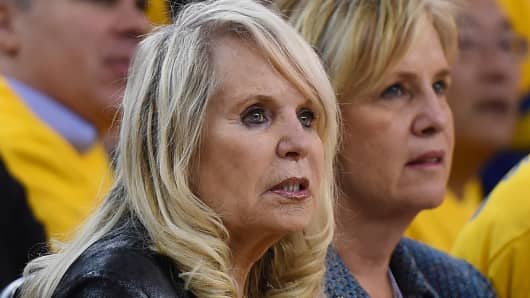You can see the problem with forcing Mrs. Sterling from the league even if her husband is found guilty. No one is talking about dropping the Los Angeles Clippers from the NBA. If more than one person has an ownership interest in a team, the constitution allows the termination of the ownership interests of fewer than all of them. Charges will be brought against Mr. Sterling alone. Regardless of Mr. Sterling's fate, it is hard to see how Mrs. Sterling could be called a "guilty owner" whose ownership interest in the team may be terminated.
It is no answer to say that the non-recourse clause of the NBA constitution means Mrs. Sterling can't challenge a decision of the league against her. That is true only to a point. Subsection (j) of Article 14, which sets out the termination procedure, says: "The decision of the association made in accordance with the foregoing procedure shall be final, binding, and conclusive, and each member and owner waives any and all recourse to any court of law to review any such decision." Under New York law and the NBA constitution, an owner may challenge in court a termination decision not in accordance with the NBA constitution.
Read MoreNBA and Clippers owner headed for a legal fight?
The board's termination decision would not be self-executing if Mrs. Sterling refuses to accept it. Mrs. Sterling could challenge the board's decision when the board goes to court to enforce its decision. Such a challenge would not be unprecedented. In 1973, the Seattle Supersonics successfully challenged the decision of then-NBA Commissioner Walter Kennedy fining the team $10,000 and awarding its first round draft pick to the Philadelphia 76ers to punish the Sonics for signing a player over whom the 76ers had exclusive negotiating rights. A federal judge concluded that the commissioner had exceeded his authority under the version of the NBA's constitution then in effect and vacated his decision.
ESPN has quoted the interim CEO of the Clippers, Dick Parsons, as saying that "A prolonged legal battle is in no one's interest, certainly not the league's." He's right. A legal fight against Mrs. Sterling — not to mention Mr. Sterling — is no slam dunk.
Commentary by Dan Eaton, a partner with the San Diego law firm of Seltzer Caplan McMahon Vitek where his practice focuses on defending and advising employers. He also is a professor at the San Diego State University College of Business Administration where he teaches classes in business ethics and employment law. Follow him on Twitter @DanEatonlaw.


